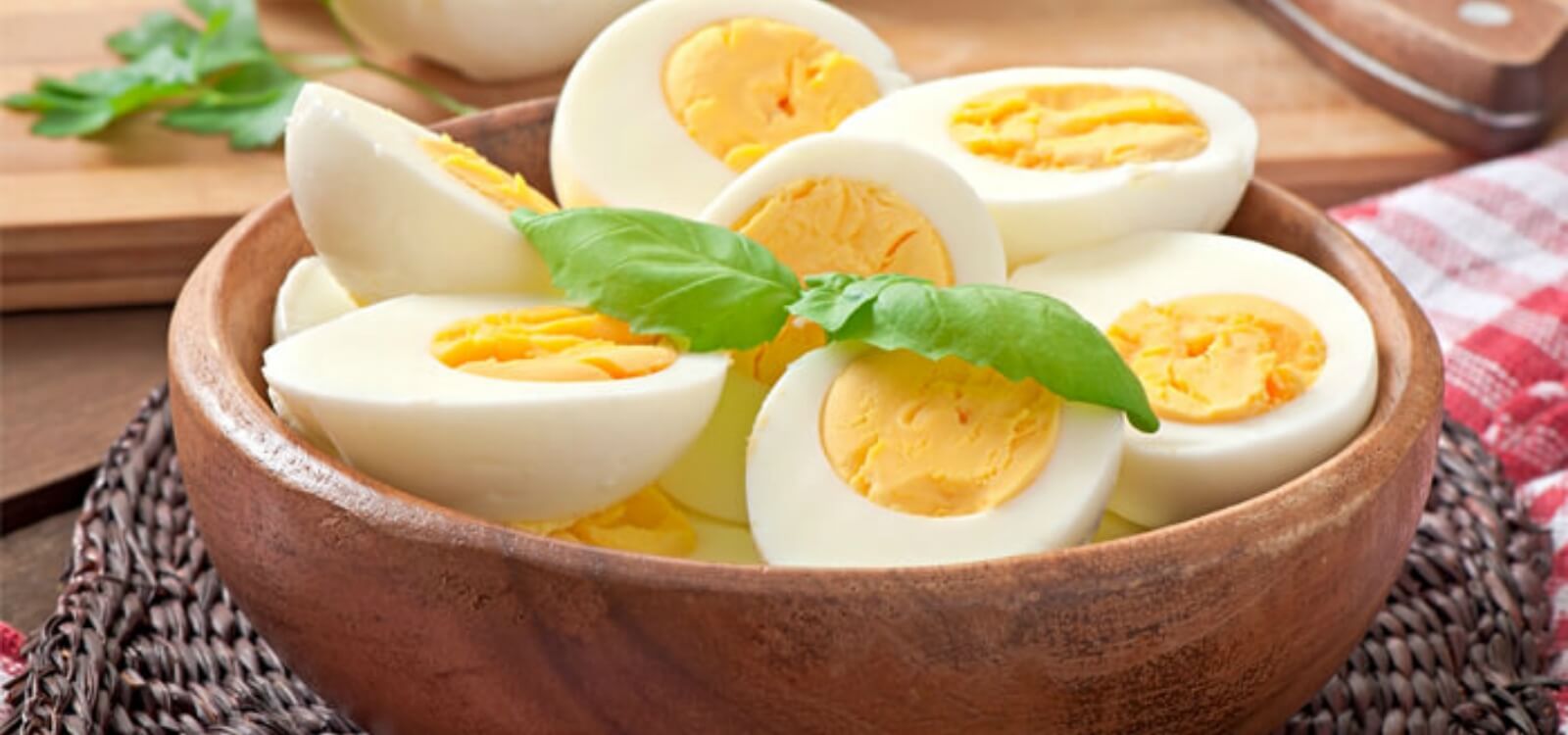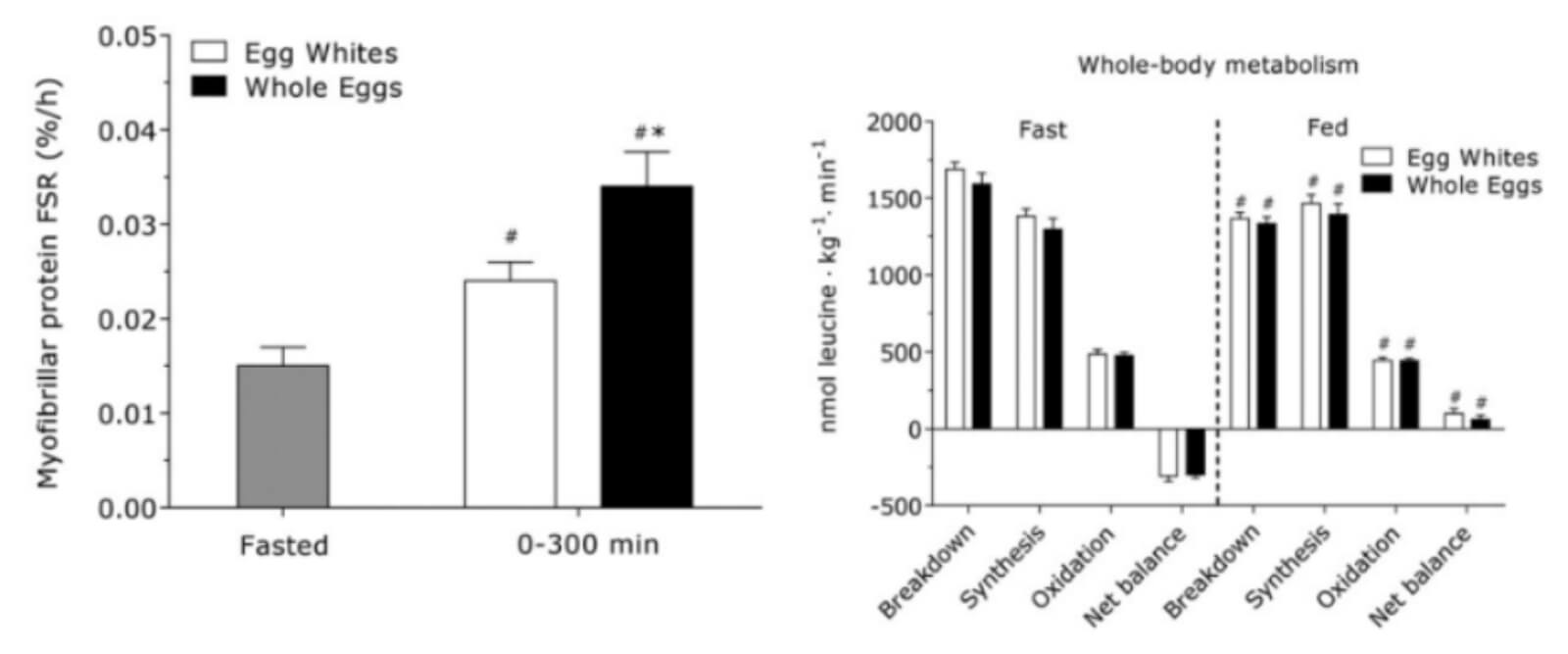Key Takeaways
- Researchers wanted to see if eating whole eggs after lifting weights caused more muscle protein synthesis than eating egg whites.
- Sure enough, the people who ate whole eggs had 42% higher muscle protein synthesis for 5-hours after the workout than the people who ate egg whites.
- It’s not clear if this would actually lead to muscle growth over time, though it does mean that whole eggs are probably just as good as other protein sources for your post-workout meal, if not slightly better.
If you’ve read anything about bodybuilding, you’ve heard about how important it is to eat a post-workout meal.
You’ve probably also heard that your post-workout meal should contain fast-digesting protein and carbs, but little or no fat.
Why?
Because the faster the amino acids in your post-workout meal enter your bloodstream, the sooner they can increase protein synthesis and, theoretically, the more they’ll be used to build muscle. Fat takes longer to digest than protein or carbs, so it’s generally verboten post-workout.
That’s the standard dogma, anyway, and it’s why most people usually rely on low- or no-fat high-protein foods like skim milk, skinless chicken breast, and egg whites.
Food isn’t just protein, carbs, and fat, though.
Some research suggests not only is avoiding fat post-workout probably unnecessary, it could be counterproductive.
Case in point, whole eggs.
Many people only look at eggs as a source of protein, like whey, and thus throw out the yolks for a few reasons:
- They’re high in cholesterol, which many people still think is bad for you (it’s not).
- They’re high in fat, which many people think slows down the digestion of protein post-workout.
- They’re high in calories, which makes it hard to get much protein from eggs without going over your daily calorie needs.
What if eggs offered more than just a tasty, low-calorie, whole-food source of protein, though?
That’s what a team of scientists from the University of Toronto wanted to find out in a study published in 2017.
Let’s look at what they did and what they found.
What Did the Researchers Do?

The researchers had 10 young men (21 years old on average) do a leg workout that consisted of 4 sets of 10 reps of both leg extensions and leg presses.
Then, they split these guys into 2 groups:
- One group ate 3 whole eggs immediately after the workout.
- The other group ate an equivalent amount of protein (18 grams) of egg whites immediately after the workout.
Then, they used several different methods to see how “anabolic” both meals were:
- They laced the eggs with compounds called “isotope tracers” which allow scientists to see how much of the protein in the eggs was making its way into the muscle tissue versus how much was going to other organs.
- They measured how fast each meal raised leucine levels, and how long leucine levels remained elevated after each meal. Leucine is an amino acid that helps initiate protein synthesis, and generally foods that cause a faster and more prolonged increase in blood levels of leucine are considered better for muscle growth.
- They poked a needle into the legs of these young men and pulled out a tiny piece of muscle tissue. Then, they ran tests on these samples to directly measure how much protein synthesis was occuring in the muscle fibers.
The scientists performed these tests several times over the 5-hour period after the workout to see how well each meal kept protein synthesis levels elevated.
Then, they had everyone come back to the lab on a separate occasion to repeat the whole process, except both groups switched places.
Everyone who ate whole eggs the first time ate egg whites the second time and vice versa. This is known as a “cross-over” design, because everyone “crosses over” to the other group later in the study.
This allowed them to see how each person responded to the different post-workout meals instead of just looking at the group average.
What Were the Study Results?
People who ate whole eggs had 42% higher levels of muscle protein synthesis than people who ate only egg whites over the 5-hour period after a workout.
Here’s what the results look like:

The chart on the left shows how each meal affected myofibrillar protein fractional synthetic rate, which is a complicated way of saying, “How much protein synthesis was happening in the muscle fibers.”
Protein synthesis levels rise in many organs in the body after eating a meal, but what you really want to know is whether or not muscle protein synthesis is increasing.
If you look at the chart on the right, you can see that whole body protein synthesis was more or less the same between both groups.
If you look at muscle protein synthesis, though, the people who ate whole eggs had 42% higher levels of protein synthesis than the people who only ate whites.
Why?
Was there something uniquely anabolic about the whole eggs versus the egg whites?
The researchers aren’t sure, though they offered a few plausible explanations:
1. It could be that the extra calories from whole eggs increased protein synthesis.
The whole eggs contained 226 calories, whereas the egg whites only contained 73 calories, and eating more calories is a proven way to keep protein synthesis elevated. That’s probably not what’s going on here, though.
A similar study found that drinking the same number of calories from whole milk caused a larger increase in protein synthesis than skim milk, despite consuming less protein.
Calories still matter, but how much you eat in a single meal isn’t as important as your intake over time when it comes to building muscle.
2. It could be the cholesterol content of the egg yolks increased protein synthesis.
Some data shows that people who consume more cholesterol build more muscle than those who eat less. Cholesterol is involved in the production of testosterone and other anabolic hormones, so it’s possible that may partly explain the difference.
That data is still pretty shaky, though, and it’s unlikely this would make any difference after just 5 hours.
3. It could be that the some of the other compounds in egg yolks may work together to affect gene expression related to muscle growth.
Egg yolks also contain vitamins, minerals, and unique fatty acids like phosphatidic acid, arachidonic acid, palmitic acid, and DHA that may promote muscle growth.
For example, some studies have shown that arachidonic acid supplementation affects signaling pathways related to muscle, but with a dose that was twice as high as what these guys were getting from eggs. In this study, both whole eggs and egg yolks caused the raise changes in genes related to muscle growth, so we can probably cross this explanation off the list, too.
So, are whole eggs better for muscle growth than egg whites?
It looks like it at first glance, but short-term spikes in protein synthesis don’t necessarily translate into more muscle growth over time. For example, at least in newbie lifters, the rise in protein synthesis that occurs 6 hours after a workout isn’t associated with how much muscle they build during a 16-week training program.
At the very least, this study shows that you probably don’t need to make your post-workout meal zero or low-fat. Leucine levels rose slightly higher after eating egg whites, which indicates the egg whites were digested slightly faster, but that didn’t result in more protein synthesis.
In other words, having some fat with your post-workout meal probably isn’t going to make any difference in how effective that meal is at stimulating muscle growth.
What Does This Mean for You?
When it comes to your post-workout meal, your number one priority is to eat enough protein.
After that, you want to make sure it’s a high-quality protein source that’s rich in leucine, like whey protein, pea protein, or meat, poultry, or seafood.
Once those two things are in place, what else you do is far less important.
What we can say is that if you want to eat whole foods after a workout instead of slamming a protein shake, eating whole eggs may give you slightly better results than egg whites …
… or it could also make no difference. We just don’t know yet.
They sure made this guy happy, though:












